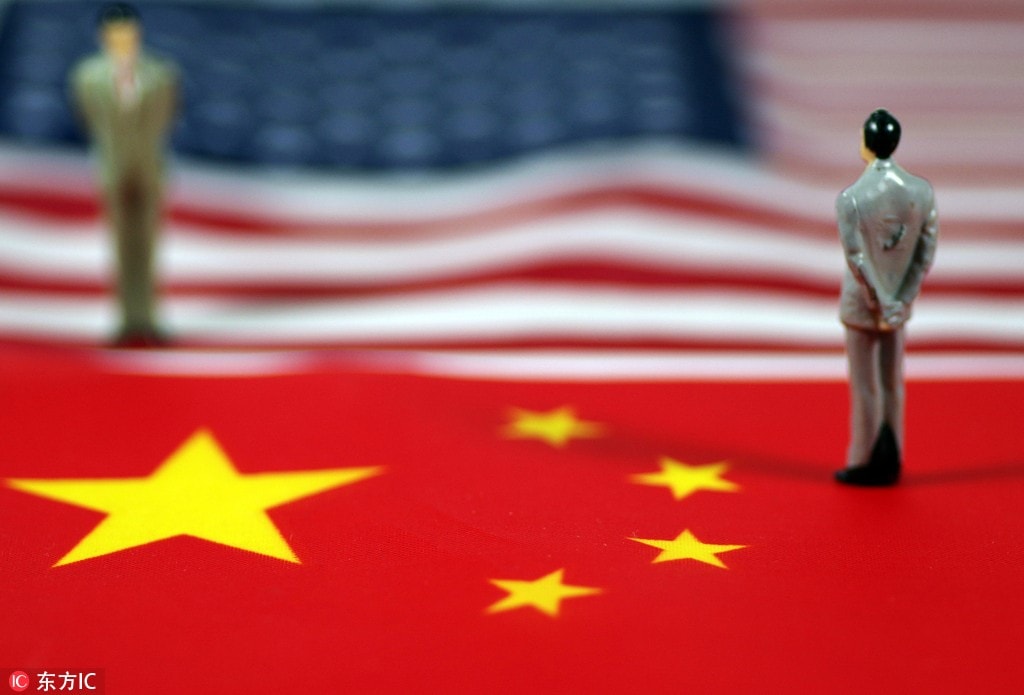Scholars from all around China gathered on September 19, 2020 for the 13th "Expert Forum," organized by the Editorial Department of the International Security Studies Journal (国际安全研究) and the People's Liberation Army (PLA) Information Engineering University (Luoyang Campus) in Luoyang, Henan Province. The topic of the forum was "Assessing Sino-U.S. relations."
Subsequently, on October 10, 2020, the Journal, which is affiliated with the University of International Relations (UIR) in Beijing, published the conference proceedings of 11 Chinese international relations scholars who had participated in the event. The collection of articles was translated by the journal as "Future Development of Sino-U.S. Relations and World Landscape."[1]
One of the contributors was Chinese academic Ni Feng (倪峰), Professor and Assistant Director of the Institute for American Studies at the Chinese Academy of Social Sciences (CASS).[2] In his article, Ni explained that the fundamental logic that had propelled Sino-U.S. relations in the past was "convergence of interests," but that today, the deep Sino-U.S. interdependence has begun to "decouple." Decoupling, he stated, has become the new, trendy word to describe a likely economic breakup between the two countries.
Unlike in the past, he wrote, when the Sino-U.S. cooperation was greater than Sino-U.S. competition, today the points and areas of competition between the two greatly exceed the points and areas of cooperation. This competition is very broad in scope, he explained: "Not only is it a struggle for interests, but it is also a struggle for strategy and power between competing systems and ideologies." He added that the course that Sino-U.S. relations will take in the future will determine the common future of the world and of humanity.
Below is a complete translation of Ni Feng's article in "Future Development of Sino-U.S. Relations and World Landscape."[3]

(Source: Chinadaily.com.cn)
The 'Decoupling' Of The Deep Sino-U.S. Interdependence Is Gradually Gaining Momentum
"Since the Trump administration came to power, Sino-U.S. relations have undergone major and dramatic shifts. With Trump's first term coming to a close, looking back now we might infer that the changes were fundamental. His term represented a reversal of ties, to an extent that it could also overturn them, which could mark a significant turning point in the historical process of Sino-U.S. relations. We can think of these major changes from a lateral and a vertical perspective.
SUPPORT OUR WORK

"From a lateral perspective, the first is a change in the temporal and spatial backdrop of Sino-U.S. relations. After the end of the Cold War, the world entered an era of economic globalization. The two parallel markets have vanished; capital, technology, and personnel have begun to flow around the world, and borders between countries have become increasingly blurred. That is the starting point after the end of the Cold War. However, since 2016 this trend has overturned, marked by Brexit and Trump's election. At present, basic global trends are showing that economic globalization is ebbing, the free flow of various essential elements is curbed by increased resistance, and borders between countries have become visibly distinct once again. The unanticipated novel coronavirus pandemic in 2020 further disrupts the reciprocal links among all parts of the world, while calls for national 'fortification' have become more prominent. This is the basic temporal and spatial backdrop of the current Sino-U.S. ties, which have undergone fundamental changes compared to previous periods.
"The second change is in the fundamental logic behind Sino-U.S. relations. When it comes to economic globalization, the term we often use to describe the ties between China and the U.S. is 'deep interdependence' –'You have me and I have you' – the two countries are each other's greatest economic and trade partners. Convergence of interests is the fundamental logic that propelled Sino-U.S. relations in the past. Having our interests align in such way had made us confident that Sino-U.S. ties could never be too good or too bad.[4] But when we talk about this issue today, what is the phrase that comes up most often? 'Decoupling' is the answer. This is clearly the total opposite; the deep interdependence has begun to 'decouple' and this [decoupling] is gradually gaining momentum. As the material benefits of the bilateral relationship are gradually being stripped away, the ideological struggles and geostrategic games between [the two] have intensified. In particular, since the outbreak of COVID-19, ideological conflicts and geostrategic competition have sidelined economic and trade frictions and have become the front line of struggle between the two countries. And while there may be room for bargaining and win-win situations in economic and trade disputes, the essence of ideological and geostrategic conflicts is that they are a zero-sum game. This shows that the fundamental logic behind Sino-U.S. relations has undergone a complete reversal.
"Third, there is a change in the basic pattern of the development of Sino-U.S. relations. Once, when we spoke about the development of bilateral ties, we would usually say that there were conflicts, competition, and cooperation but that there was always more cooperation than competition. That was the basic understanding and conclusion people would make when they discussed bilateral ties in the past, and that's just the facts. Otherwise, the development of Sino-U.S. relations would not have seen such relatively healthy development. And why am I describing it as 'relatively healthy'? Because cooperation has always been greater than competition.
"But this conclusion is clearly no longer valid today. It can be said that the points and areas of competition between China and the U.S. greatly exceed the points and areas of cooperation, and this has determined the direction of the fundamental development of the bilateral ties. As a result, there is little surprise that relations between China and the U.S. have plunged into freefall.
Sino-U.S Relations Will Determine The Common Future Of The World And Of Humanity
"Finally, there are changes to China's strategic environment. Strategic competition between the U.S. and China has not only severely poisoned the atmosphere of Sino-U.S. relations, but has also had many negative effects on China's overall strategic environment. As competition between China and the U.S. has become the main contradiction in the game between the big powers, the U.S. is accelerating its geostrategic alignment against China. At the beginning of Trump's administration, he attempted to imitate Nixon's actions against the Soviet Union and to pull Russia into a China-U.S.-Russia triangle targeting China. However, due to the American establishment's resentment of Russia, Trump's efforts have basically failed. This could be called the 'Northern Triangle' against China. Although the U.S. has made little progress with the 'Northern Triangle' since 2020, it has achieved great breakthroughs with the 'Southern Triangle,' namely the China-U.S.-India triangle. Trump's [February 2020] visit to India, combined with the friction along the China-India border, have significantly contributed to the advancement of the alliance between the two countries. At the same time, different forces around the world are looking for ways to make the most of the Sino-American 'game of the century.' Some are trying to take advantage of others' misfortune, while some only seek to indulge in schadenfreude. Some are using the situation as an excuse to show their force, and some are waiting for the situation to change before they make a move. Some are sitting on the mountain to watch the tigers fight to exhaustion before they step down to reap the rewards. The strategic pressure that China faces will become more multidimensional and diversified.
"From a vertical perspective, the current changes in relations between China and the U.S. are the most extensive and profound since Nixon's China visit and the establishment of Sino-U.S. diplomatic in 1979. The current great game between the two countries has made it impossible for bilateral relations 'to go back to the past.' The 'past' referred to by Henry Kissinger is the 'past' from 1972 onwards. The current game indicates the end of an era for Sino-U.S. relations. Secondly, judging from the development of Sino-U.S. relations since the founding of the PRC, the current great game between China and the U.S. means that bilateral relations have entered a new historical period. If the 1949-1979 Sino-U.S. hostilities against the backdrop of the Cold War marked the first stage in the development of bilateral relations, and the 1972-2016 cooperation based on common interests was the second stage, the current relationship marks a new stage, different from the previous two. At this stage, the prevailing 'dogfight' between China and the U.S. may accompany the entire duration of the second centenary goal of the Great Rejuvenation of the Chinese Nation.[5]
"Finally, looking back to the beginning of the exchanges between the two countries, 236 years of mutual exchanges have elapsed since the American merchant vessel Empress of China first set sail to China in 1784. In between, the two sides have separated and merged; feelings of love, hatred, friendship, and enmity are incessantly interwoven; sometimes they appear as enemies, sometimes as friends; 'their ties are cut, but never severed; their mind is going wild.'[6] However, in these complicated relations, these two countries have never simultaneously considered the other as their key strategic rival.
"In a century of Sino-U.S. exchanges, the current situation is unprecedented. These relations have therefore entered uncharted waters, and both countries might go through a difficult debugging process. This problem is brand new and wide-ranging, and is set against the backdrop of a century of sweeping changes. The answer may not have yet been written.
"In short, a century of change and a century of rejuvenation collide like waves, and Sino-U.S. relations have already entered the great game of this grand and strategic era. Competition is vitally important for achieving objectives and interests. It concerns not only the Great Rejuvenation of the Chinese Nation and the perpetuation of American hegemony, but also the fundamental transformation of the relationship between Western and non-Western countries and the eventual reshuffling of the global balance of power. Competition can last for a very long time, and it can accompany this century of change and the entire duration of the realization of the centennial goal of Great Rejuvenation. Competition is very wide in scope. Not only is it a struggle for interests, but it is also a struggle for strategy and power between competing systems and ideologies. Competition has an overall impact and can define the final trajectory that this century will take.
"Whether or not the giant ship of Sino-U.S. relations can maintain the right course will not only influence the interests of the two peoples, but will also determine the common future of the world and of humanity."
[1] Journal of International Security Studies, October 10, 2020, DOI: 10.14093/j.cnki.cn10-1132/d.2020.06.001.
[2] Ni Feng was a Fulbright Scholar at SAIS, Johns Hopkins University, from 1999-2000, and published a number of books and articles on China-U.S. relations, foreign affairs, foreign policy, and the politics of post-Cold War U.S. and Russia and globalization.
[3] Gjaqyj.cnjournals.com/ch/reader/view_abstract.aspx?file_no=20200601&flag=1, October 10, 2020.
[4] Ni Feng paraphrases here a quote attributed to Deng Xiaoping, which has become a stock phrase for the need a pragmatic approach to the bilateral relations between China and the U.S.
[5] "The Great Rejuvenation of the Chinese Nation" is indistinguishable from "The Chinese Dream," a key expression of the current administration since Xi Jinping took office at the end of 2012 as Secretary General of the Communist Party of China. The Great Rejuvenation is achieved by fulfilling the two centennial goals. According to official Chinese discourse, at the end of 2020, a century after the establishment of the CCP, the first milestone of "building a moderately prosperous society in all respects" has been achieved. In practical terms, this means eliminating poverty and doubling the 2010 GDP per capita income. The second centenary will be celebrated in 2049, the 100th anniversary of the establishment of the People's Republic of China, at which point China will be "a modern socialist country that is prosperous, strong, democratic, culturally advanced, and harmonious and reach the level of moderately developed countries."
[6] A quote from "I Climb the Western Tower in Silence" (无言独, 上西楼), a poem by Li Yu (李煜, c. 937-978), the last emperor of the Southern Tang dynasty.




